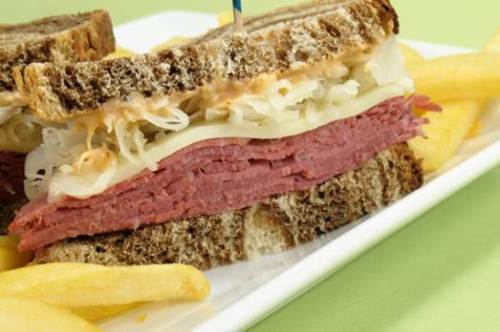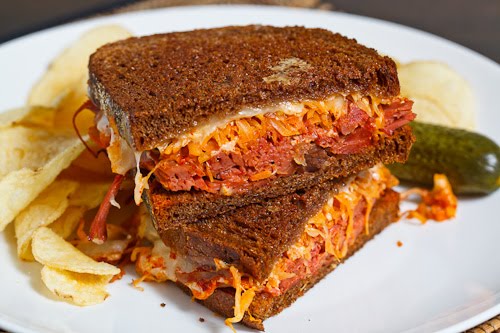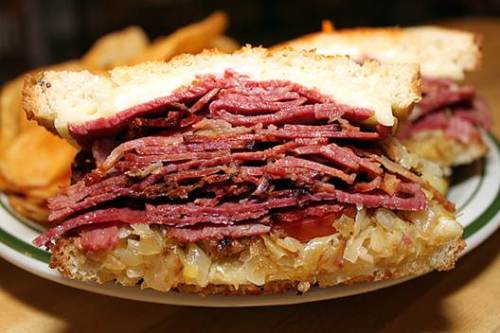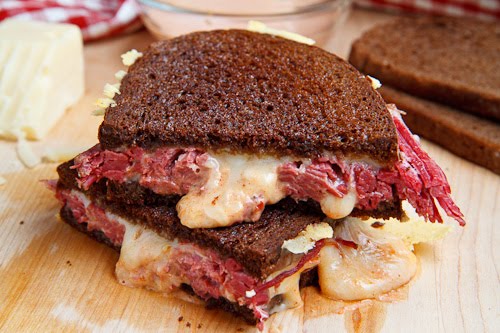“There’s no reason why this should be as good as it is…well, no, you’re right, corned beef. Right, that, that helps a lot.”
~Reuben Scientists (shut up, they exist)
When we undertook the foolhardy-in-retrospect project of listing every regional submarine-style sandwich in America, we were greeted by a lot of feedback. Mainly, “What about the sandwiches that aren’t shaped like dicks? What about those sandwiches.” Of course, if we had expanded our criteria to include all sandwiches in America, we’d all be dead, having emotionally snapped and rented a bus to drive our whole staff into the ocean somewhere between writing up the dagwood sandwich and the Limburger sandwich. Our families wouldn’t have even shown up at the funerals, so worried that the corpses would spring back to life to tell them to spend twenty minutes complaining that the Jibarito isn’t nearly well-known enough to warrant its own Wikipedia page. Ultimately, the decision to limit the sandwiches in our regional sandwiches articles was the right one, both for the marriages of our staff as well as for our rapidly depleted alcohol supply, but it did leave us feeling a little hollow. What was the point in tearing out our hair to scrap together a few sentences on how people who call sandwiches “sarneys” are terrible people who should pay for what they have done, if we don’t get to reward ourselves by looking at pictures of delicious non-elongated sandwiches. Sandwiches that we love, that we crave, that make our lives better.
Sandwiches like the Reuben.
The Reuben is either your favorite sandwich, or the sandwich you always forget about until you see someone order a Reuben and say, “Goddamn, it’s been a while since I’ve had a Reuben, I’ll take one too, now that you mention it.” Everyone appreciates it, even though most of us probably think that the Reuben has foreign, possibly European, origins. It’s not an unfair assumption. After all, this is a toasted rye bread sandwich that’s filled with ingredients that are considered Jewish or Irish (corned beef), Swiss (cheese), Russian (dressing), or German (sauerkraut). Of course, the very multicultural aspect of the Reuben itself should be a clear indicator that it has American origins, though the simple fact that it’s delicious and savory and way more unhealthy than even your worst assumptions (yes, yes, all the saturated fats, all of them into the churning maw) should be enough of a clue as far as its Americanness goes. And we’re going to let you in on the American history of this cultural hodgepodge of cured meat, fermented cabbage, and mayonnaise haphazardly mixed with ketchup. Not because the Reuben is the sandwich you need, but because it’s the sandwich you deserve.
The American History Of The Reuben Sandwich
The Reuben is a simple yet delectable combination of corned beef, Russian dressing, sauerkraut, and Swiss cheese, toasted in between two pieces of rye bread. Your stomach loves the sandwich about as much as it hates your shirt, and with all the dripping sauce, meat, and cabbage, trust us when we say it loathes your shirt and would want nothing more than to send it to its dry cleaning doom. Sure, there are variations out there, such as replacing the kraut with coleslaw and the corned beef with pastrami (the “Rachel”), or replacing the Russian dressing with Dijon mustard (the “West Coast”), or even just swapping out Russian dressing with Thousand Island “practically the same as Russian” dressing (the “Reuben where someone used a slightly different dressing”). It’s a sandwich with only five ingredients, which admittedly makes it more labor intensive than the BLT or the PB&J or other sandwiches that can be described by randomly shouting out a handful of letters, vowels be damned.
And while the Reuben is arguably America’s most popular hot sandwich, there are dueling accounts as to its creation. So we decided to step in and further muddle the discussion by mentioning the theories behind the sandwich’s invention without adding anything particularly worthwhile to the narrative other than to remind the nation that a Jack and Coke is a delicious way to wash down one of these suckers.
There are two theories regarding the existence of the Reuben, both of which shockingly center around people with the last name of “Reuben.” The earliest, though lesser acknowledged, of the two lays credit to Arnold Reuben, the German-born owner of the now defunct Reuben’s Delicatessen in New York City. Reuben’s was first opened in 1908 and moved several times (once each in 1916, 196, 1935, and a final time in the mid-60s after being sold off to new ownership) before finally closing in 2001 due to health code violations. The restaurant claims to have originated the Reuben sandwich in 1914 at the request of an Annette Seelos, an actress working as a leading lady of Charlie Chaplin’s at the time. According to an anecdote imparted to a 1976 New York Times article by Craig Claiborne regarding the origin of the sandwich, Arnold Reuben’s daughter asserted that Seelos came in one night and said, “Reuben, make me a sandwich, make it a combination. I’m so hungry I could eat a brick.” Instead of serving her an actual brick to serve as a well-deserved lesson regarding the consequences of exaggeration, he took two slices of rye bread and filled it with Virginia ham, sliced roast turkey, Swiss cheese, coleslaw, and doused it in with his deli’s special Russian dressing. While this is not by definition a Reuben sandwich, it’s similar enough that you can claim it was a natural evolution to go from “ham and turkey” to the much more delicious “beef that has been cured with corns of salt to with wonderful results.”
When Seelos ate it, she continued her quest to come off as one of the more obnoxious people ever by saying, “Gee, Reuben, this is the best sandwich I ever ate. You ought to call it an Annette Seelos Special.” Instead of slapping the sandwich right out of her hands, Arnold replied by saying, “Like hell I will. I’ll call it a Reuben’s Special.”
Wrong kind of Reubens
Because fame breeds ungrateful children, Arnold Reuben’s son, Arnold Reuben Jr., claimed responsibility for the sandwich in a 1993 article to the St. Petersburg Times. In the article, he claimed that while working in his father’s restaurant in the 1930’s, the deli was so popular that he never had time to sit down and eat, so each day he would ask the chef to make him a hamburger to quickly eat. One day the chef working there, Alfred Scheuing, decided he was tired of seeing Reuben eat nothing but hamburgers, and decided to make him a sandwich using some corned beef he had just prepared. He added the corned beef to some buttered and toasted pumpernickel before adding Swiss cheese and sauerkraut to add flavor to the sandwich. Again, this is close to a Reuben, but not quite all the way there, which is why the most likely origin for the Reuben sandwich comes not from New York, but from the Midwest.
It’s widely believed that the Reuben sandwich was invented not in the Mecca of delis known as New York, but rather in the Corn Belt. Specifically, Omaha Nebraska. Some of you might hear, “Omaha is the birthplace of the Reuben” and say, “Oh, that makes sense. Corned beef is the primary ingredient,” at which point we’d have to call you an idiot and point out that there isn’t any corn in corned beef. You idiot.
Go on, sit in your corner, and think about the idiotic thing that just came out of your mouth. No, we’re serious, we won’t continue until you sit in the corner.
Still waiting.
There. Good.
In the 1976 New York Times piece on the Reuben, a Lithuanian-born grocer named Reuben Kay was responsible for the invention of the sandwich, which came to existence around 1925 during the weekly poker game he held in the Blackstone Hotel. In fact, this is so prevalent of a belief that Reuben Kay was named as the inventor of the sandwich in the 1994 film Quiz Show. While the details are correct, the name of the inventor actually is Reuben Kulakofsky, some people would just shorten his last name to the letter “K” since they couldn’t pronounce his full name. The story itself is basic—Kulakofsky came up with the combination of ingredients at a poker game in the Blackstone, and the hotel’s owner, Charles Schimmel, liked the sandwich so much that he put it on the hotel restaurant’s menu, naming it after its creator. This is a well-worn story in Omaha, and most attempts to insinuate that the sandwich was born outside of Omaha, or at the very least the state of Nebraska (the earliest record we have of a Reuben showing up on a menu was at a 1937 Lincoln, Nebraska hotel restaurant) is met with the closest Nebraskans can come to outrage (namely, sending polite notes to various publications to inform them that the Reuben was, in fact, invented in Omaha).
Of course, this account has even been challenged, as a recent article by Elizabeth Weil states that her grandfather, Bernard Schimmel, worked as a chef at the Blackstone Hotel in 1928 after training to be a chef in Lausanne, Switzerland for a year. According to this account, Reuben Kulakofsky called down to the kitchen asking for a corned beef and sauerkraut sandwich. Schimmel took that order, added Thousand Island dressing, layered it with Swiss cheese, and put the whole thing on rye bread, which he then grilled. Weil claims to have typewritten notes from Schimmel with this recipe, which calls for it to be served with a sliced kosher dill pickle, a rose radish, and potato chips. She also claims that her great-grandfather was the one to put it on the Blackstone Hotel’s coffee-shop menu, as well as the menus of all the hotels of the Blackstone chain.
Ultimately, the Reuben began get national attention in 1956 when Fern Snider, a former Blackstone waitress, entered the Reuben into a national sandwich competition (we miss the days that those existed) and won.
We’re just going to assume that it won handily.
However the Reuben actually came into existence (we’re personally leaning towards one of the two Omaha stories being the correct one) all that matters at the end of the day is that one of the best hot sandwiches out there, a savory mix of oozing cheese, flavorful corned beef, dripping dressing, and intermingling sauerkraut comes from America. And though that shouldn’t surprise us that such a wonderful thing was born from the minds of Americans, it’s still something we should be proud of. And we are. Now who wants to get their Reuben on?






Pingback: American Sandwich Series: Classic and Timeless American Sandwiches (Part 2) | affotd
Pingback: The World’s Saddest Cuisines: Estonia | America Fun Fact of the Day